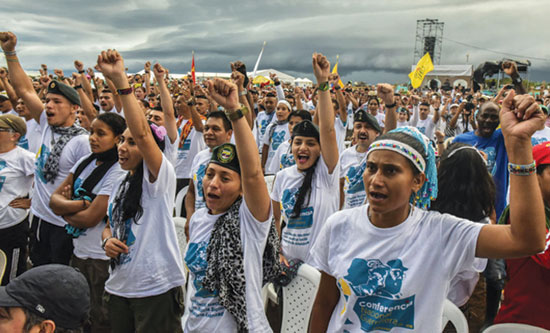
30 November 2017 saw the end of a year-long ‘fast track’ period for Colombia’s Congress to pass urgently needed measures to consolidate the Havana Peace Accords. These measures represent about a tenth of the overall agreement between the FARC and the government, yet after a year only about a fifth of this tenth have been acted upon. The government of Juan Santos has lost its majority in the Congress as his opportunistic coalition members hunt around for deals with other parties in anticipation of the March Congressional and 1 May Presidential elections in 2018. Santos can now plead that his hands are tied. In November 2017 the Constitutional Court and Senate changed the Justice Model agreed at Havana, creating serious difficulties for the reintegration of FARC (military) members into civil society.
A year after the agreement, supervised by 700 UN observers, FARC has now completely disarmed. Some 7,000 members and 7-8,000 militia were ‘reincorporated’ into civilian life, and 9,000 weapons surrendered. More than half of the demobilised FARC members had left the camps by mid-November, but disillusionment is extensive as, according to the Head of the UN mission, they are ‘still being detained by the National Police, having difficulty accessing the banking system or signing contracts with the State’. There are shortcomings in the medical care provided for ex-guerrillas, some of whom are disabled and chronically ill.
Demobilisation took place more quickly than similar processes in El Salvador and Guatemala. Colombia’s ruling class is consequently emboldened to weaken the peace agreement and undermine the development of a strong non-violent political opposition. Indeed, the government has blocked steps to end the violence directed against ex-FARC militants and has stood aside while 130 civilians have been assassinated this year (11 were peasant farmers supporting crop substitution for coca) and 28 ex-FARC members. Even the ‘early warning’ systems put in place to call in the Colombian army to protect villagers from paramilitary attacks have been ignored by the military. FARC has always been concerned that right-wing paramilitaries could repeat the killing of some 5,000 members of the Patriotic Union, its legal campaigning expression, in the 1980s and 1990s.
The land question
This was at the heart of the 53-year civil war and remains central to the class struggle today. The government itself admits that six million hectares were violently robbed from the small peasantry during the war. The Victims’ and Land Restitution Act was passed in 2011 yet since then, only 60,000 hectares have been returned, while 25 peasant leaders have been murdered. Fifteen per cent of the national territory was stolen by large land owners during the war. Ten million hectares was identified to be returned to six million peasants. Seven million hectares is being worked by peasants without title, which would be given to them under the agreement. Three million hectares more would be distributed from state owned land to peasants driven off their farms. In this process, FARC actively supported small peasant property rights against the astonishingly centralised ownership of land in the country – two-thirds of agricultural land is concentrated in just 0.4% of farmland holdings. One year after the agreement there is still no land fund that would make this possible, so the rural development legislation cannot be implemented. The majority of FARC members are from the rural poor and so are unable to return to farming. The UN Secretary General sent his under-secretary to Colombia in November to express strong concern that land titles had not been given to former combatants. The Havana Treaty has status as a UN Document. The UN has had to send a second mission of 480 officials to support the reincorporation process in the face of Colombian government ambivalence.
Coca plant farming
At Havana the FARC willingly agreed to support the removal of illicit coca cultivation in the light of the promised rural reforms. Pilot projects for the replacement of coca plants have been set up, but the Attorney General still blocks the decriminalisation of coca cultivation, deterring the most impoverished farmers from coming forward to claim support. Meanwhile, ex-FARC members are offered about £200 a month social pay for two years to support them whilst job hunting. This is less than the minimum wage. Criminal gangs will pay £3,000 a month for an ex-FARC mid-ranking commander and £1,500 for lesser ranks. Under these circumstances it is a credit to FARC that the whole process has seen the retention of strict discipline among its demobilised members.
The Justice Model
The Havana agreement established a Truth Commission, a Special Jurisdiction for Peace and a Transitional Justice Tribunal, which will carry out criminal investigations. The Tribunal will investigate crimes by both uniformed and non-uniformed actors. The International Criminal Court has noted the absence of any of the extensive right-wing para-military forces before this Tribunal, and now civilian prosecutions seems to have been removed and senior state officers will not be tried there, only those from the lower ranks. This is a clear modification of the Havana agreement.
This is a dangerous period for the Peace Agreement in Colombia. The ruling class continues to ignore the terrorism of para-military groups attacking the rural communities, and is squeezing the Havana agreement.
The FARC
In all this the FARC reconstituted itself in September, as the new FARC or the Common Alternative Revolutionary Force, thereby retaining the same acronym to ensure that its determined, communist revolutionary reputation is maintained. The peace agreement guarantees the FARC five seats in each of the two legislative chambers for two terms. Iván Márquez, a member of FARC’s secretariat will lead the Party. He was elected to congress for the Patriotic Union party during a previous attempt at peace. FARC will not field a candidate for president in the 2018 elections, preferring to seek a coalition with other leftist forces. ‘We will fight against corruption and the rot of those who have been governing our country,’ said leading comrade Pablo Catatumbo.
Alvaro Michaels
Fight Racism! Fight Imperialism! 261 December 2017/January 2018




